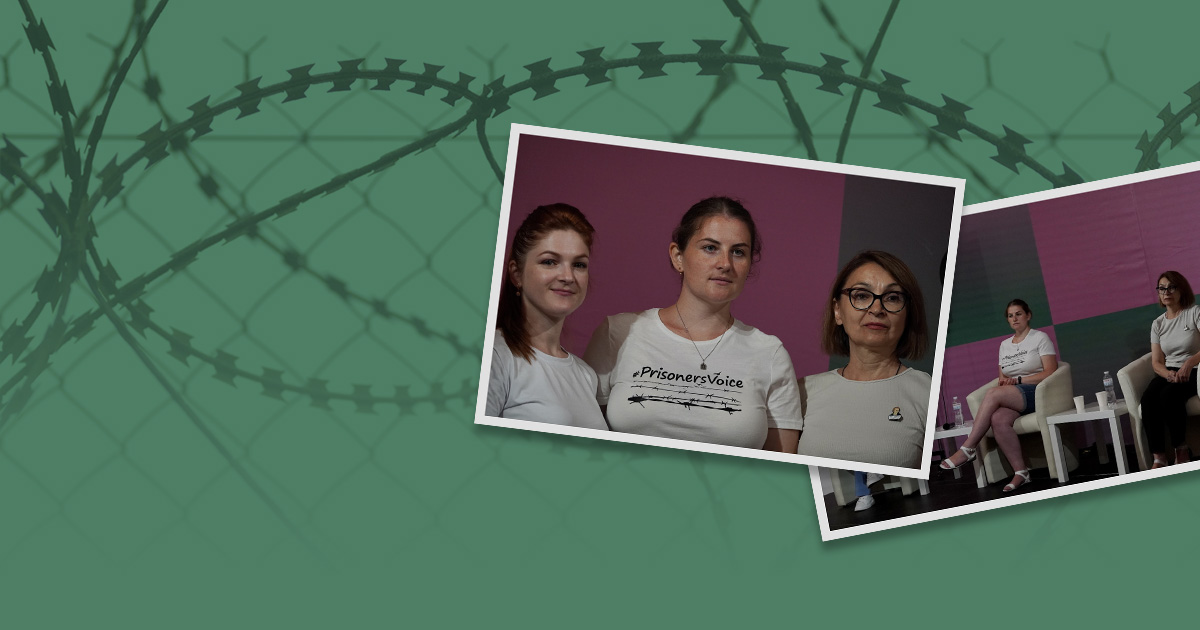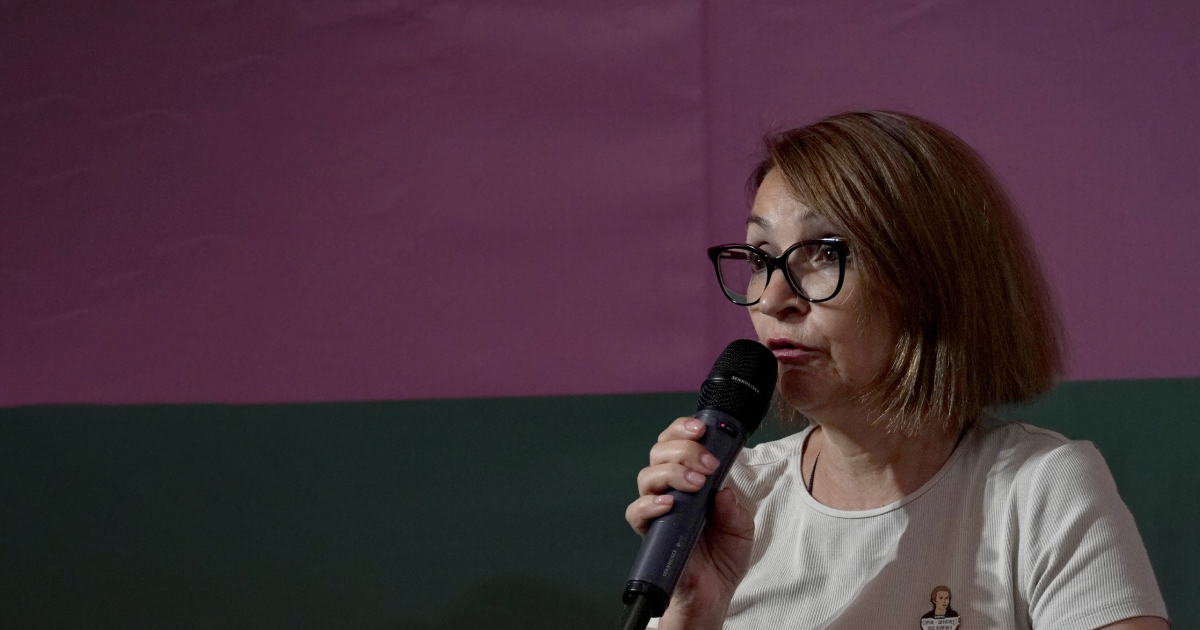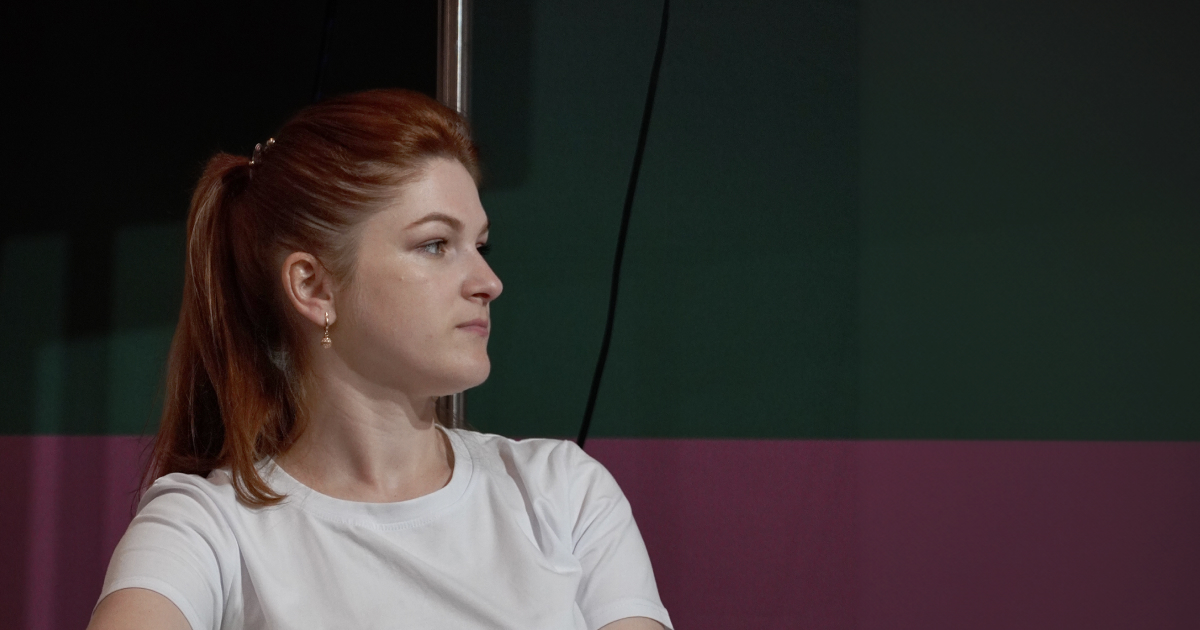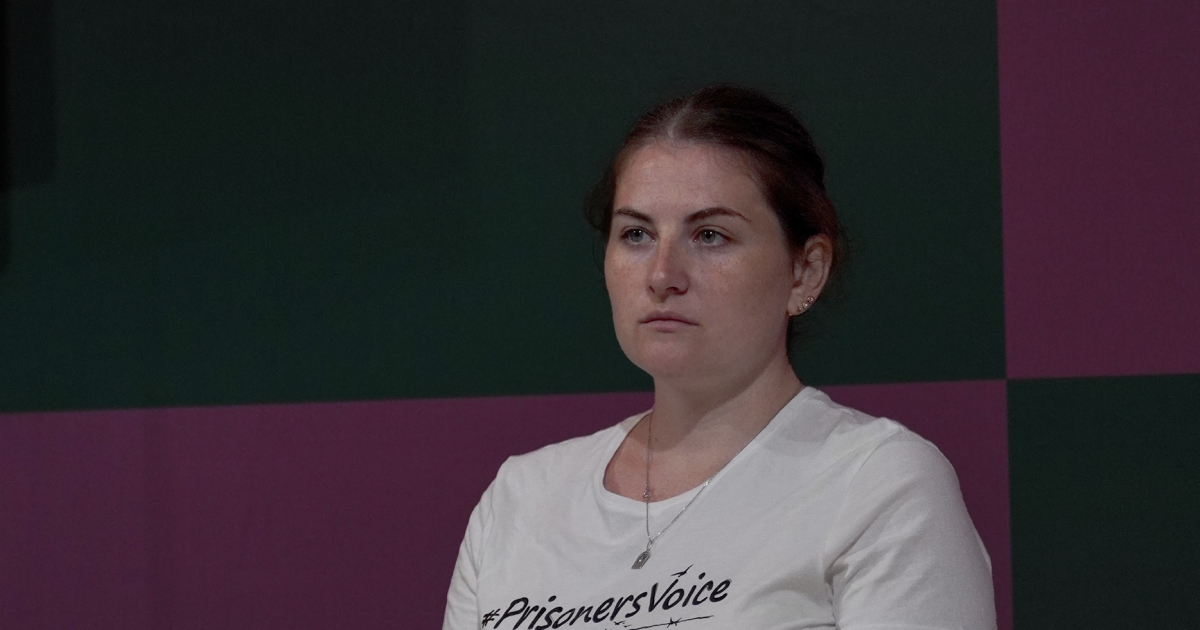Women's voices. What Ukrainian women go through in Russian captivity

Liudmyla Huseinova, Mariana Mamonova and Viktoriia Andrusha are three Ukrainian women of different ages, different professions and from different regions. But all of them were in Russian captivity: in 'Izoliatsiia', the detention centre, and the Olenivka colony.
During the Book Arsenal, the women spoke about their experiences and how to treat people who survived captivity and reintegrate them into society.
Liudmyla Huseinova: "Don't call us victims — we are survivors"
Liudmyla Huseinova is a human rights activist who, after the outbreak of the Russian-Ukrainian war in 2014, lived in the temporarily occupied Novoazovsk, Donetsk region, worked at a local poultry farm and took care of orphans in the occupation.

She brought clothes, Ukrainian books and postcards from the government-controlled territory to the boarding school in Prymorske. They were transported to Mariupol, and from there, the woman delivered the goods through the checkpoint.
In October 2019, Huseinova was detained. She spent 50 days in the Izoliatsiia torture chamber and almost three years in the Donetsk Detention Centre, in the same cell with criminals.
Liudmyla Huseinova was one of 12 civilians returned by Ukraine on October 17, 2022, as part of a 'women's exchange'.
"Civilian women were detained in 2015, 2016, 2019 and 2020. I spent 50 days in the [Donetsk torture chamber] 'Izoliatsiia' - those were the most terrible days of my life. Any woman in 'Izoliatsiia' was not just tortured — she was raped.
In addition to physical torture, women in captivity have no medical care. They have no right to defence. They have no right to meet with their families.
Then I was transferred to the Donetsk Detention Centre. Political prisoners like me were held together with criminal women at that time. You are pressured not only by guards, investigators and operatives but also by those with whom you have to share a cell 24/7.
There were 20 women in my cell, and there was not enough space to even stand. A hole in the floor was a toilet. But the worst thing is that almost all these women were members of the so-called 'DPR'.
When I first entered the cell, I could not see anything because of the cigarette smoke. They had a so-called 'warden' who looked at me for a long time and then asked me what article I was under. At first, I was accused of extremism, and she immediately labelled me a "'ukropka" (a Russian derogatory name for Ukrainian women — ed.).
You constantly see the evil eyes of people imprisoned for violent crimes, murder, who drink heavily. You don't know what to expect — I was afraid even to turn my back. Then I discovered that most were sick: AIDS, tuberculosis, syphilis. The bunks are paired, so you sleep in the same bed with a woman with such diseases.
When the full-scale invasion began, the pressure became even greater. The aggression from both the guards and those in the cell increased. In the summer of '22, we saw through the windows how our prisoners of war were being led away with bags over their heads and hands tied behind their backs. When they fell, the guards would kick them. We heard prisoners forced to sing the Russian anthem and shout Russian slogans.
I know that now politically convicted women are held in the same cell. And they are being abused even more. At this moment, Olha Meleshchenko is undergoing torture. When she was arrested in 2020, her youngest son was four years old — the child has not seen his mother for almost three years.
"But never call us victims — we went through this and survived. We are survivors. Understanding that you are not a victim but a person who has been able to go through this gives you the strength to move on, develop and help others. I want the women released from captivity to know they can and should live on," said Liudmyla.
Mariana Mamonova: "It is better to be a criminal convict than a Ukrainian soldier in captivity"
Mariana Mamonova is a military nurse stationed at the Azovstal plant during the siege of Mariupol. It was there that she found out she was pregnant. In early April, she was taken prisoner by Russia.

Mamonova was exchanged on September 21, 2022, at the same time as the Azov commanders and over 200 soldiers. Four days later, she gave birth to a daughter.
"There is no medical care for Ukrainian women in Russian prisons. I was taken prisoner when I was three months pregnant, but I did not get special treatment. Only in the seventh month did an obstetrician and a nurse come to see me. He was called because I had so severe swelling that I could not move.
They examined me in the cell where I was locked up. There were no suitable conditions. They said everything was fine. But the head of the colony said: "She looks so scary. Do something with her because it's our responsibility". I was taken to one of the hospitals in Donetsk. They did an ultrasound examination of the child and said everything was fine.
Medical care stopped altogether when the stocks of medicines we took along when we left Azovstal ran out. They told us: "The 'DPR' does not allocate medicines to you, and you have eaten everything you had."
When you see a person released from captivity, accept them for who they are. They are no different, but they have had a difficult life experience. Talk to them as you would to ordinary people, do not focus on where they have been and what happened to them.
Someone will ask you not to mention it; someone may want to tell you about it. But never forget these people need support and long-term rehabilitation. It will take time for them to let the world know about themselves, but we must not forget about them," said Mariana.
Viktoriia Andrusha: "Either you learn to build immunity against bullying, or you start to fade away as a person"
On March 25, 2022, Russians kidnapped Maths and Computer Science teacher Viktoriia Andrusha from her home in Staryi Bykiv, Chernihiv region. The woman's phone contained data on the movement of Russian equipment, which she had been passing on to the Ukrainian military. Viktoriia was taken to the Russian Federation and held in the Kursk Detention Centre.

On September 29, Ukraine released four marines and two civilians from captivity, including Viktoriia.
"We were not divided into civilians and military. We were all together, and the treatment was the same. We had to constantly turn to the wall and give any answers like in the army: "Yes, sir" or "No, sir". They punished you for doing things differently from what they wanted, even when no one set an example, and you didn't know how to do it.
Once a month, they gave us hygiene products: ordinary bar soap and toilet paper. The clothes were not changed at all. Once they gave a uniform, there was nothing else.
When you first arrive at the place of detention, the guards treat you with the utmost cruelty. They said: "You are a prisoner; you have no rights here. You are not considered a human being here. You are an animal".
If they allowed you to shower for two or three minutes once a week, you should be happy that they allowed you to do so. They ironically talked about the "book of complaints and suggestions" and provoked us to release their anger. Even when they heard the Ukrainian language from prisoners communicating with each other, they always came to the cell, knocked loudly on the door and demanded to speak Russian.
The convoys changed once a month. Every new one who appeared tried to engage and provoke in some way. At first, they use physical violence, and then they put psychological pressure regularly. They see that the prisoners feel bad and openly say they like it and can do it. You either learn to build immunity against abuse and not react, or you start to fade away as a person.
After captivity, I didn't want anyone to touch me. I just said that I would approach them when I wanted to. Let a person breathe freedom. They will get into the rhythm of life and tell you what is comfortable and what is not," says Viktoriia.
According to the National Information Bureau, as of the end of June 2023, 126 women were held in Russian captivity. Of these, 46 are military, and 80 are civilians. The Media Initiative for Human Rights has identified 42 places of detention in the Russian Federation — pre-trial detention centres and penal colonies. They are located both in the regions bordering Ukraine and Russia's interior.


